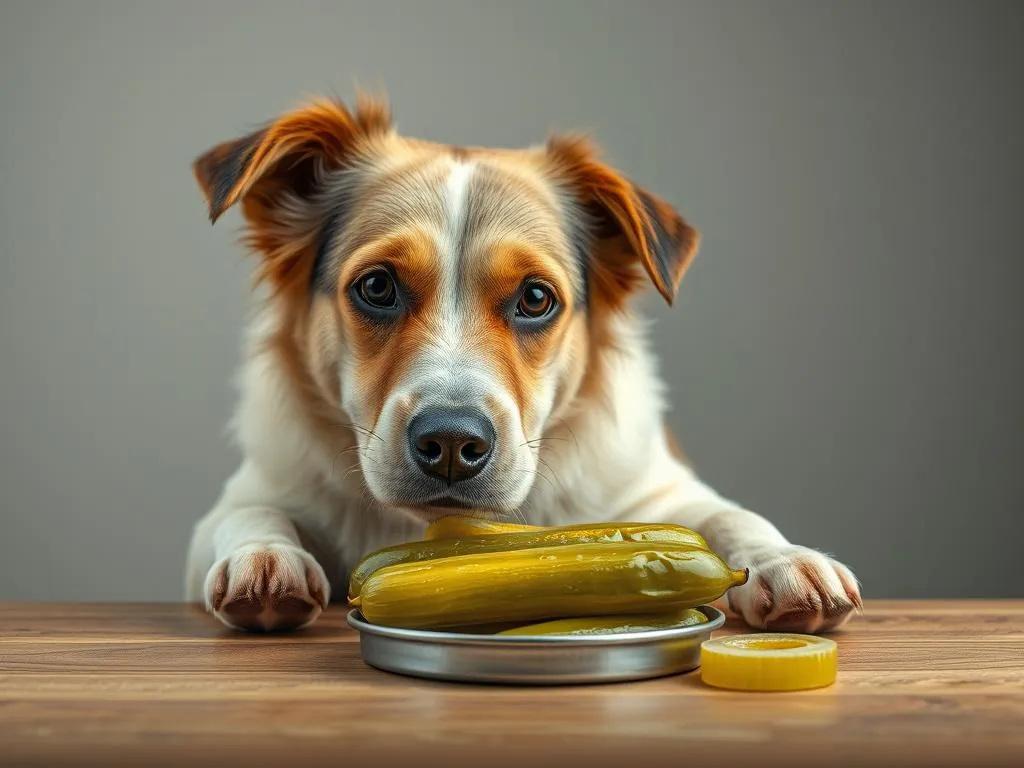
Introduction
Proper dog nutrition is a cornerstone of responsible pet ownership, influencing everything from energy levels to overall health. As dog lovers, we often find ourselves wondering about the safety of certain human foods for our furry companions. Can dogs eat pickles? This question arises frequently, alongside inquiries about other common human foods like grapes, chocolate, and peanut butter. Understanding which foods are safe and which are harmful is crucial for keeping our pets healthy and happy.
Understanding Dog Nutrition
Basics of Dog Nutrition
A balanced diet for dogs consists of several key nutrients: proteins, fats, carbohydrates, vitamins, and minerals. Proteins are essential for muscle development and immune function, while fats provide energy and support cell structure. Carbohydrates serve as an energy source and aid in digestion. Vitamins and minerals are vital for various bodily functions, including bone health and metabolic processes.
When it comes to dog food, pet owners often choose between commercial dog food and homemade diets. Commercial dog food is typically formulated to meet the nutritional needs of dogs, while homemade diets allow for more control over ingredients but require careful planning to ensure nutritional adequacy.
Common Nutritional Needs by Dog Age
Nutritional requirements vary significantly depending on a dog’s age. Puppies need a diet rich in proteins and fats to support their rapid growth and energy levels. Adult dogs require a balanced diet to maintain their health and energy. As dogs age into their senior years, their dietary needs may change again, often necessitating lower calorie intake and adjustments to support joint health and overall well-being.
Signs of Good Nutrition in Dogs
Healthy dogs exhibit certain signs that indicate they are receiving proper nutrition. These include a shiny coat, healthy skin, appropriate energy levels, and a stable weight. Regular vet check-ups can help monitor a dog’s health and ensure their nutritional needs are being met.
Human Foods and Dogs
The Risks of Feeding Dogs Human Food
While it might be tempting to share our meals with our canine companions, feeding dogs human food can pose risks. Certain foods are toxic to dogs, leading to serious health issues. For example, chocolate can cause seizures, and grapes can lead to kidney failure. Understanding which foods can harm your pet is essential for their safety.
Safe Human Foods for Dogs
Fortunately, many human foods are safe for dogs when given in moderation. Some examples include:
- Carrots: A crunchy, low-calorie treat.
- Rice: A good source of carbohydrates, often recommended for digestive issues.
- Pumpkin: A great source of fiber and nutrients.
Always remember that moderation is key, and how food is prepared can significantly impact its safety for dogs.
Can Dogs Eat Pickles?
Nutritional Content of Pickles
To determine whether dogs can eat pickles, we first need to look at their nutritional content. Pickles are typically made from cucumbers, vinegar, salt, and spices. Cucumbers are low in calories and high in water content, which can contribute to hydration. However, the vinegar and salt used in pickling can present challenges for dogs.
Potential Health Benefits of Pickles for Dogs
Fermented pickles can contain probiotics, which may be beneficial for a dog’s digestive health. The water content in cucumbers can also help keep dogs hydrated, especially during hot weather. However, these benefits need to be weighed against the risks associated with other pickle ingredients.
Risks and Concerns of Feeding Pickles to Dogs
Despite the potential benefits, there are significant risks to consider when it comes to feeding pickles to dogs:
-
High Sodium Content: Pickles are often loaded with salt, which can lead to sodium ion poisoning in dogs. Symptoms include excessive thirst, urination, and even more severe health issues if ingested in large quantities.
-
Vinegar Effects: The acidity of vinegar can irritate a dog’s stomach, leading to digestive upset. Dogs with sensitive stomachs may experience more severe reactions.
-
Spices and Additives: Many pickles contain spices, garlic, or onion, which are toxic to dogs. Always check the ingredients before offering pickles to your pet.
How to Safely Introduce Pickles to Your Dog’s Diet
If you’re considering offering pickles as an occasional treat, moderation is key. Start with a small amount and monitor your dog for any adverse reactions. It’s safer to choose plain, homemade pickles without added spices or high sodium levels. If you find that your dog enjoys cucumbers, consider offering fresh slices instead, which provide hydration without the risks associated with pickling.
Expert Opinions and Research
Veterinarian Insights
Veterinarians generally advise against feeding pickles to dogs. While a small amount of plain cucumber may be safe, the added salt and vinegar in pickles can pose health risks. Many vets emphasize that it’s best to stick with dog-safe treats and foods specifically designed for canine diets.
Research Studies on Dogs and Human Food
Research on dogs consuming human food has shown that while some human foods can be safe and nutritious, others can lead to health complications. Studies indicate that the long-term effects of feeding dogs human food can vary significantly based on the type of food and the individual dog’s health. It’s crucial for pet owners to consult with a veterinarian before introducing any new foods into their dog’s diet.
Conclusion
In summary, understanding dog nutrition is essential for keeping our pets healthy and happy. While can dogs eat pickles? The answer is generally no, due to the potential health risks associated with their high sodium content and the presence of vinegar and spices. Always prioritize your dog’s safety by consulting with a veterinarian regarding their diet and any human foods you consider introducing into their meals. Remember, a balanced diet tailored to your dog’s individual needs is the best way to ensure their long-term health and well-being.
FAQs
Can dogs eat dill pickles?
Dill pickles, like other pickles, often contain high levels of sodium and vinegar, which can be harmful to dogs. It’s best to avoid them.
Are there any benefits to feeding pickles to dogs?
Fermented pickles can contain probiotics, which may benefit digestive health, but the risks generally outweigh these potential advantages.
How often can I give my dog pickles?
If you decide to offer pickles, do so very occasionally and in small amounts, monitoring for any adverse reactions.
What should I do if my dog eats pickles?
If your dog consumes pickles, especially those high in sodium or containing spices, contact your veterinarian for advice, particularly if they exhibit any signs of distress.
References
- Veterinary resources and articles on dog nutrition and human foods.
- Research studies related to canine diets and health impacts of human food consumption.









